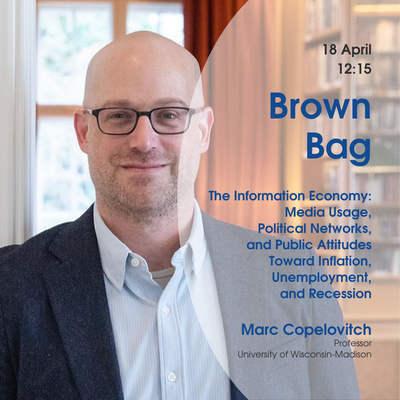18 Apr 2024
Brown Bag Seminar,
12:15 - 13:15,
Anna Nussbaum Auditorium, World Trade Institute,
Hallerstrasse 6, Bern, Switzerland
Brown Bag Seminar with Marc Copelovitch, University of Wisconsin-Madison
Marc Copelovitch, Professor in the Department of Political Science and the Robert M. La Follette School of Public Affairs at the University of Wisconsin-Madison, will join the WTI for the upcoming Brown Bag. His presentation is on:
The Information Economy: Media Usage, Political Networks, and Public Attitudes Toward Inflation, Unemployment, and Recession.
Abstract
We seek to understand how individuals’ views on the economy are influenced by the information they are exposed to through media usage and political talking partners. Analyzing data from a nationally representative survey of 2000 US residents, administered through YouGov in August 2022, we show that individuals that consume more conservative media are more likely to view inflation and unemployment as serious problems, more likely to be pessimistic about the state of the US economy, and more likely to believe the US is currently in a recession or will be in the future. We also find that greater consumption of more “mainstream” media has the opposite effects. Importantly, the magnitude of these effects is at least as large as the material and sociotropic factors found previously in the existing literature to shape individuals’ attitudes toward the economy and economic policy.
Similarly, we find that political talk networks strongly shape individuals’ views about the economy, especially the partisan gap between respondents and their partners. Through two experimental treatments embedded in our survey, we also explore the degree to which providing additional domestic and global context about the state of the US economy shapes individuals’ views. The main experimental result is that providing global context increases respondents’ concerns about unemployment and a future recession. We also find strong heterogeneous effects between global context, partisanship, and the partisan gap between respondents and their partners. Our analysis strongly suggests that the “information economy” in which individuals participate plays a crucial role in shaping their attitudes about the state of the real economy
About the speaker
Mark Copelovitch is a professor in the Department of Political Science and the Robert M. La Follette School of Public Affairs at the University of Wisconsin-Madison. He studies and teaches international political economy and international relations, with an emphasis on the political economy of international money and finance, international organizations, and the politics of economic shocks and financial crises. His work sits at the nexus of political science and economics and the intersection of international relations and comparative politics.
He also studies European politics and the European Union, with a focus on the political economy of the Eurozone and the EU's role in the world economy. He has been the Director of the Center for European Studies at UW - Madison and, from 2022-25, holds the European Commission's Jean Monnet Chair in the European Union and the Global Economy.
In Spring 2024, he is the Axel Springer Fellow at the American Academy of Berlin and a Visiting Researcher in the Transformations of Democracy Research Group at the WZB (Berlin Social Center).
We strongly encourage you to attend this event on-site. In case you cannot be present in person, please register here to attend online (via Zoom): https://us06web.zoom.us/meeting/register/tZ0lcOCvqDIpEtOtfAu_OpEDvrcSPjp2toCE
Further info
Prof Copelovitch’s Personal website
Twitter profile
BlueSky profile


